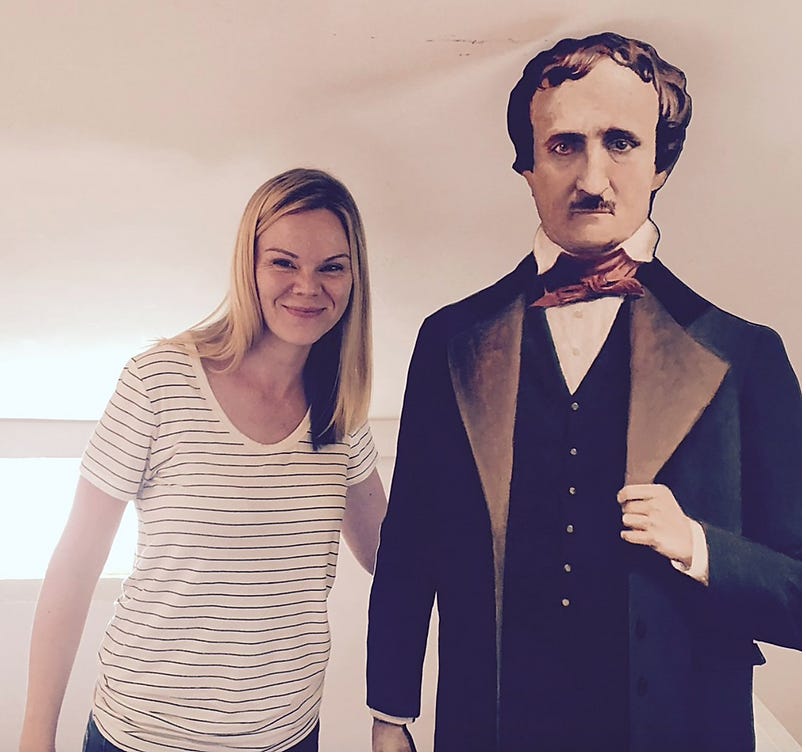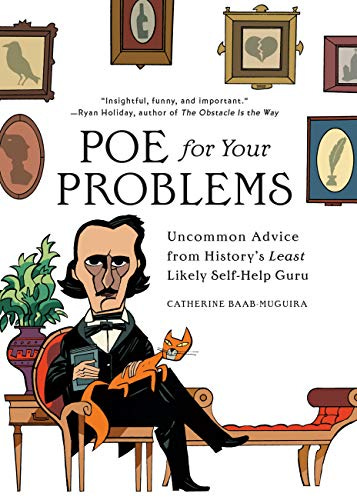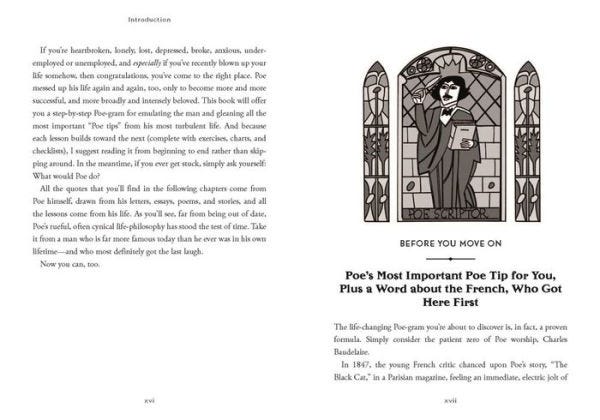Last weekend, I judged a costume contest at the Congressional Cemetery and declared the winner an Edgar Allen Poe lookalike. I immediately began pushing Catherine Baab-Muguira’s Poe for Your Problems: Uncommon Life Advice from History’s Least Likely Self-Help Guru on him.
Throughout it, Catherine draws lessons from Poe’s life – which included marrying his cousins, living in financial precarity and getting fired from job after job — to help guide us all through our lives. Still, the book is darkly funny and oddly inspiring.
I first discovered Catherine and her book after reading a Substack post she published about the finances of writing a book (she estimates she made $6.86/hour on it) and we’ve since launched an internet correspondence. She was kind enough to chat with me about Poe, her book and the difficult quest to make money from writing. Our conversation has been edited and condensed for clarity.
How did you come to see Poe as the person who could save your life?
He’s not a likely candidate for that necessarily. So, I grew up in Richmond, Virginia, which a lot of people will know is Poe’s hometown too. He spent his childhood and some of young adulthood here. He’s a local presence. We read him very early in school here and I can remember my fourth-grade teacher reading “The Raven” in class.
For a little kid in my circumstances — super middle class, who watched a lot of TV and went to church — it was this powerful experience with encountering art. Then I tore through him. I did an English degree and a masters. Poe isn’t beloved by the academy, necessarily, but then in 2016, I had a major depressive episode — the worst of my life. I had to take mental health leave from my job. I found myself at this moment where I couldn’t concentrate on anything. I got this craving to read Poe again for the first time since I was a little kid.
It was the most delicious relief to plunge into this stuff that is so much about psychological pain. It was speaking my language at that moment. Then, when I moved on from the work to the letters and biographies. It’s such a disputed field. It’s a bit of a jigsaw puzzle. The historical record is patchy and how to interpret it has become kind of an epic game in American literature. This drew me in.
When I recovered a bit, I wrote an essay about this experience for The Millions. It went viral, in a literary world way. I was able to get an agent and write a proposal on the back that. Then, over 18 months I sold it and the book came out in 2021.
What’s the response been?
Now that it’s out in the world, it seems that roughly 50% of people instantly understand the idea and get the joke of it. The other half of people are like, ‘what the hell is this?’. That’s probably not a bad ratio.
I think for dedicated Poe fans, there’s always been this intuitive understanding that he’s a fellow traveler and a bit of hero, given that he produced his work in incredibly sad circumstances.
I'm a little bit of a cynic, but I find that to be such a hopeful message. He had an impossible personality, was unemployable, feuded with everybody and didn’t have stable relationships. It’s a relief to fall in with someone who also screwed up from time to time. More often than not, it makes you feel better.
You mentioned Poe’s biography is disputed. What do most people get wrong?
There’s his reputation as a drug addict, which is completely undeserved and untrue. Opium references were a real convention of fiction and poetry at the time — Sherlock Holmes, Byron. Their fiction and poetry was just full of it. It’s in Poe’s work too, a lot people will remember it from the Fall of the House of Usher.
In any case, he wasn’t a drug addict. He took laudanum twice and both times were pretty expressly attempts to commit suicide.
His behavior was much less erratic than people take it to be. We have this idea of the mad genius, but if you’re a working writer, then you know that writing is the most boring thing in the world. You’re just sitting in a chair producing your work. Poe produced thousands of pages in his lifetime and his career was roughly 20 years long. You cannot produce that kind of volume if you are falling of the wagon left and right.
I initially found you through your Substack post about earning $6.86/hour on your book. What made you decide to share that information?
From my copywriting days, I know highly specific numbers are amazing clickbait. Plus, I love it when people talk about the financial dimension of their artistic life. That's catnip to me. I think there should be more of it.
People often have a completely mistaken notion of how this all works. I've always had a day job. There's no way I could not have a day job while writing a book. I think it's good for the world to advertise the fact that you make so little at this and it's not really a living, or at least not for me.
Lastly, any books you want to recommend?
One I read recently that I love and think it's such an interesting, important book about fandom is called One’s Company by Ashley Huston. It's so good. It’s one of most original, interesting and insightful things about fandom I have read. I completely relate to this experience of just like wanting to move into the woods and a compound where you're alone with your fandom. I wish more people had read that because I need to talk about it.
Thanks to Catherine for chatting. You can buy her book here and follow her on Twitter and Instagram. I also highly recommend checking out her newsletter, in the coming months she’ll be interviewing authors about how they got their first book deals.
What to Read If is a free weekly book recommendation newsletter. Need a rec? Want to gush about a book? Reply to this email, leave a comment or find me on Twitter @elizabethheld.
If you're reading this on Substack or were forwarded this email, and you'd like to subscribe, click the button below.
Disclosure: I am an affiliate of Bookshop.org and I will earn a commission if you click through and make a purchase.







Thank you, Cat and Elizabeth! Writers absolutely need more "straight talk" about the financial realities of "making it" as a writer. We're an army of dreamers with our collective head in the clouds. Our success depends heavily on our return to earth. 🙂
Great interview! I'm a huge Cat fan and her book, and her newsletter, are both delightful.